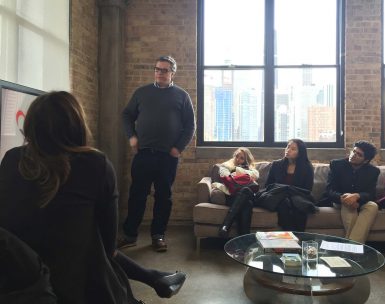Alumni turn media skills into entrepreneurial opportunities

After seeing numerous cliché wedding photo montages, Elise Jaffe, a 1999 telecommunications alumna, and her husband, Gregg, realized they could do a better job.
In 2005, Jaffe started Big Teeth Productions as a production studio that created videos for personal events, such as weddings. The company now produces everything from public relations and advertising video campaigns to social media videos to short films for the company’s annual 60-second film festival.
Jaffe is just one of many Media School alumni who have started their own businesses. Doing everything from TV and film production to documentary distribution, these alumni urge students to keep an open mind in school.
Caitlin Boyle graduated in 2005 with her master’s degree in journalism. She started Film Sprout in 2009 as a way to distribute documentaries and independent films to audiences who might not have otherwise seen them. Boyle works with independent filmmakers to bring their documentaries to communities or campuses.
“We want to make these films more accessible to those who wouldn’t be viewing (them) normally,” Boyle said. “We want to reach those people.”
Colin Carter, a 1981 alumnus, majored in telecommunications. He started Mode Project in 2002 as a creative studio that creates design, animation and live action storytelling content for agencies and brands.
Carter started his business in 2002 right as a technological shift was happening in the industry. He decided to use the power of desktop products, such as Apple and Adobe, to start a business that allowed for a creative process with less time and less cost.

“There is still a place for folks who want to be creative,” Carter said. “The artistic side of our business is not something that can be easily replaced by a computer.”
Carter said being in Bloomington was one of the best parts of his educational experience.
“There’s a lot going on with so much music and art,” Carter said. “It’s such a rich experience to be able to have when you’re a filmmaker.”
Carter also said the resources he had at IU, such as having access to a studio, was one of the best parts of the education.
Boyle said what really helped her as a student was having the flexibility to experiment. She could try new things and be able to find what she was really passionate about: reporting that helps the reader or viewer.
“As a grad student, you have the ability to explore and experiment,” Boyle said. “I had incredible mentorship with the faculty and WFIU, who gave me the encouragement to try new experiments.”
She added these mentors were the ones who told her she could do it. Being told you can is crucial to starting your own business, Boyle said.
“I don’t think I could’ve had the confidence and the courage if I hadn’t been encouraged to take risks and hadn’t had those confidence boosts,” Boyle said.
Jaffe said some of the most important skills she gained from IU were leadership, how to be independent and how to work with and manage a team.

She advised students not to try to start their own business until they have experience.
Two of the most important things students can do now are informational interviews and fellowships, Jaffe said. She added it’s OK if they don’t get an amazing job right after graduation. It’s important for people to spend their first few years after college learning.
But, the hard work is worth it, she said. Looking back at what she’s done, she said she’s proud.
“It’s not easy,” Jaffe said. “Don’t go into it thinking it’ll be easy.”
Boyle said the media landscape is changing dramatically, and students should be prepared to take part in that.
“We all have the opportunity to be a part of the change and transform it,” Boyle said.
She said no media career path is the same, and students are the ones who create their role in the field. She added that a lot of things have changed since she graduated, but her degree is still as relevant as ever.
Carter urged students to look everywhere when getting a job after graduation. He said there are so many different industries that use filmmaking skills, such as advertising and brands.
He said there are still plenty of places for creative jobs, even if it’s not always what you expect. Students should consider working for an industry outside of media, he said.
Having diverse interests is important for all people hoping to make it as a filmmaker, Carter said. It’s always good to experiment in art or music. He added that students should be exposed to things outside their major.
“Make things, screw things up,” Carter said. “Get your hands dirty.”
More:

